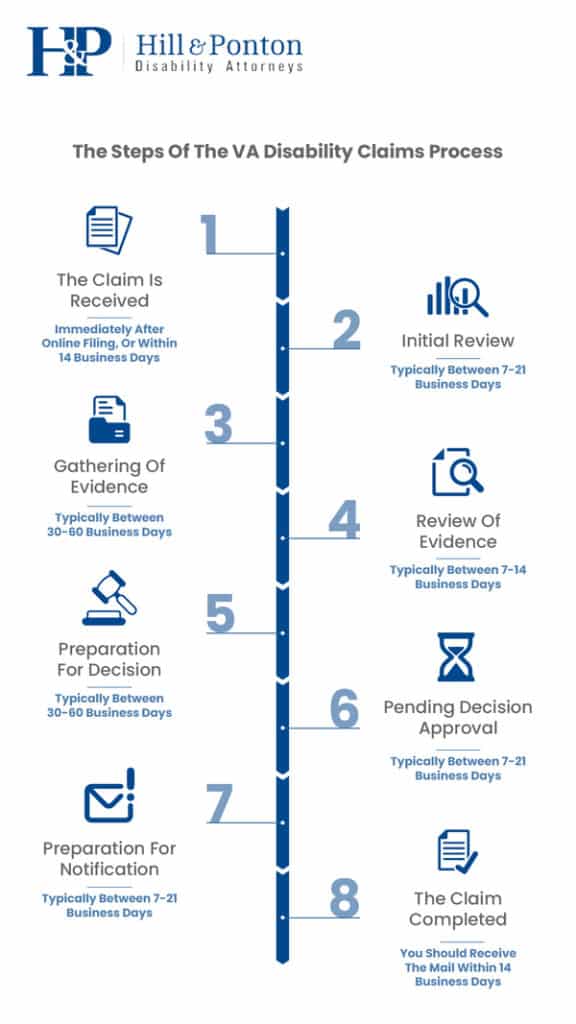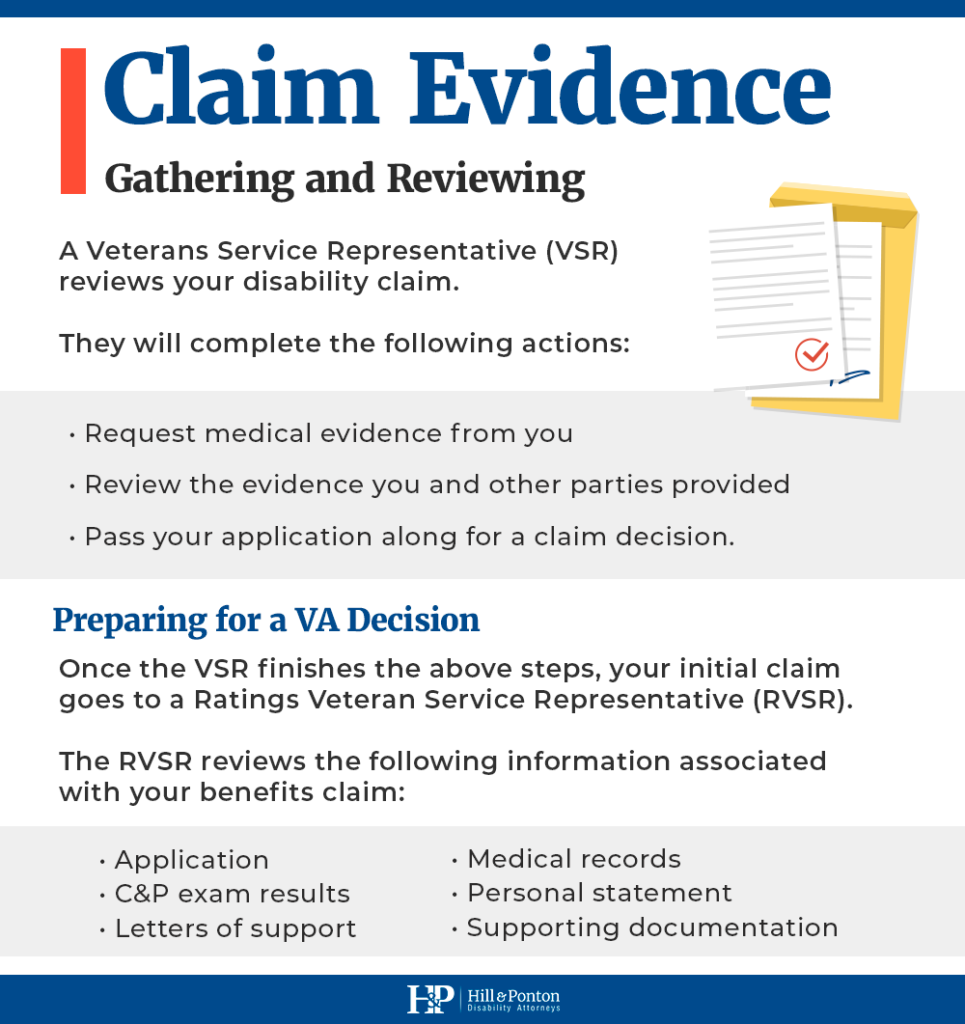If you are a veteran who has been injured or become ill while serving our country, you may be entitled to disability benefits from The Department of Veterans Affairs (VA).
The process of applying for and receiving these benefits can be confusing, however, so we have created this step-by-step guide to help make things a little bit easier.
In this guide, we will discuss the VA disability claims timeline and the process that it takes to get your VA disability rating.
There are eight different steps of the VA disability claims process and we’ll talk about how long each one typically takes.
We will also provide some tips on how to make the process go as smoothly as possible.
So, if you are interested in learning more about the VA disability claim timeline, keep reading!
How long does it take the VA to make a decision?
On average, it takes about 11.5 months (341 days) to finalize disability-related claims. This can be longer or shorter depending on the complexity of your case.
Why is it important to file a claim?
You have a disability that was caused by your service to our country.
You have gone to your local VA hospital and received treatment for this disability.
Your doctors know and have spoken with you about your disability, yet despite this, you still do not have benefits related to that disability. Why is this?
- The Veteran’s Health Administration (VHA) takes care of your healthcare, while the Veteran’s Benefits Administration (VBA) is in charge of all benefits you receive for your disabilities.
- The VA requires you officially file a claim with your local Regional Office before you can start receiving benefits.

What are the Steps of the VA Disability Claims Process?
Want to skip the blog post and get a quick explanation of the timeline from our team? Check out our video below!
Step 1: The Claim is Received
The VA will inform you when they have received your disability claim.
- If you filed online you will get a message after you submit.
- If you mailed your application, the VA will typically send you a letter within 7-14 days
Step 2: Initial Review
A Veterans Service Representative (VSR) will review your claim and most likely the VA will need more evidence to support it. This is where it will continue to move on to step 3.
Step 3: Gathering of Evidence
During this step, the VA may do the following three things:
- Ask for evidence from you, health care providers, governmental agencies, or others.
- Schedule a Compensation and Pension exam (C&P).
- Move your claim to a Ratings Veteran Service Representative (RVSR).
If they need more information during the review, your claim may return to this step, sometimes even more than once.
Step 4: Review of Evidence
- At this point, all the required information has been received and will be reviewed by the VSR assigned to your claim.
- If the VSR believes that there is evidence missing or more information is needed, you may return back to Step 3.

Step 5: Preparation for Decision
- The entire VA disability claim file will be sent to the RVSR.
- The RVSR will review the application and all supporting evidence and then begin the process of preparing the necessary documents to detail the decision that they made.
Step 6: Pending Decision Approval
This step is when the RVSR’s recommendations are further reviewed and a final award decision for your claim is determined.
Step 7: Preparation for Notification
- After a decision has been made about your claim, a Senior Veterans Service Representative (SVSR) will review the completed documentation and then authorize the release of your award letter and payment, if applicable.
- The entire VA disability ratings decision packet will be mailed to you at this point.
Step 8: Claim Completed
This is the final step of the entire claim process, and where the claim will be officially closed and the VA will mail your disability claim decision packet.
What types of evidence will help my claim be successful?
When you’re applying for VA disability benefits, the success of your claim can often rest on the evidence you submit.
This evidence must show that you meet the requirements for a specific disability rating according to the VA’s Schedule for Rating Disabilities.
In order to gather this evidence, you’ll need to know what’s required and how to get it.
There are three essential types of evidence:
- Medical evidence: medical records and subsequent treatment records
- Lay evidence: statements from people who know about you and your disability
- Expert opinion evidence: opinions from medical experts, vocational experts and specialists
Do you want to learn everything you need to know about evidence for VA claims? Let’s help you be successful.
Learn what evidence you need for your claim by clicking here!
How do I check my VA Claim Status?
It may take a substantial amount of time for the VA to make a decision about your claim.
Here are some ways to check your claims status:
- Call VA at 800-827-1000
- File at VA.gov
- Visit your local VA regional office
- Log in to VA appeals tracker
When will I get my first payment upon an approval decision?
If your decision notice shows at least a 10% disability rating, you’ll get your first payment within 15 days.
If this is your first claim, you will receive a check. If it is not your first claim, and there is no direct deposit information on record, you will receive a debit card with daily spending limits.
If you do not get a payment after 15 days, you should contact the Veterans Helpline at 1-800-827-1000.
What if I disagree with my disability rating or the VA disability claims decision?
The Department of Veterans Affairs changed its appeal process on February 19, 2019.
Anyone who received a denial or who disagrees with their disability rating, can formally appeal and seek a decision review.
You have one year from the date indicated on your decision letter to file a notice of disagreement with the VA.
The appeal process options include:
- Supplemental Claims: With this type of appeal, you can add new evidence you didn’t have available to you previously that is relevant to your initial claim.
- Higher-Level Review: Upon your request, a senior reviewer will go over your entire claim again to determine if the VA can make a new decision based on an error with the initial claim, or an error that was the result of a difference of opinion between reviewers.
- Board Appeal: At this higher level of appeal, you are requesting a Veterans Law Judge from the Board of Veterans Appeals in Washington D.C. to review your initial claim for VA disability benefits again. All judges are experts in veteran law.
Understand More About Potential Representation for your Appeal
At Hill & Ponton, we understand that fighting a denied claim with the VA can be stressful.
You may feel certain of the service connection to your disability and need funds from the disability compensation claim just to meet your basic living expenses.
If you have been denied and are filing an appeal, we can help.
Were You Denied Benefits?
Your Time is as Important as Your Claim
Your moments are precious.
Don’t waste them on legal complexities trying to fight an appeal.
Get your free case evaluation with us today.
Content Review
Cassandra Crosby, an Accredited Agent and claims advocate for Matthew Hill & Shelly Mark’s teams, reviewed the information provided in this post.







